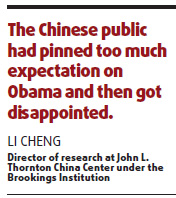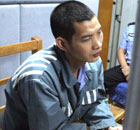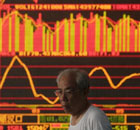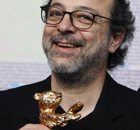Foreign and Military Affairs
Concrete actions for healthy ties urged
By Tan Yingzi in Washington and Li Xiaokun in Beijing (China Daily)
Updated: 2010-02-20 07:45
 |
Large Medium Small |
China urged the United States on Friday morning to take concrete steps for the healthy development of bilateral ties, following US President Barack Obama's meeting with the Dalai Lama despite Chinese protests against the event.
In Beijing, Foreign Ministry spokesman Ma Zhaoxu said in a statement that the US-arranged meeting disregarded China's repeated, solemn representations against it.
"The US move grossly violated the norms governing international relations and ran counter to the principles set forth in the three China-US joint communiques and the China-US joint statement," Ma said.
| |||
The US should stop interfering in China's internal affairs and take concrete action to maintain the healthy and steady growth of Sino-US relations, he said.
Ma demanded that the US seriously consider China's stance, immediately adopt measures to erase the negative impact of the Dalai Lama meeting and stop supporting anti-China separatist forces that seek "Tibet independence".
Later that day, Vice-Foreign Minister Cui Tiankai also summoned US ambassador to China Jon Huntsman to lodge a "solemn representation" over the meeting, the ministry said.
Obama met the Dalai Lama at the White House Map Room on Thursday local time. Later in the afternoon, US Secretary of State Hillary Clinton also spoke with the Dalai Lama.

Experts fear that the latest moves will worsen Sino-US ties at a time when cooperation between the two world powers is needed to face many global concerns, including the Iran and Korean Peninsular nuclear issues, climate change and the financial crisis.
Most Americans also said it is more important to maintain good relations with China rather than take a stand on Tibet, a CNN/Opinion Research Corp survey released on Thursday showed.
Similarly, US magazine Newsweek commented in an online article on Wednesday after interviewing Western experts on Tibetan studies that the huge benefits Tibetan people received from the booming Chinese economy and favorable policies from the central government should be "a fact Obama might keep in mind when he meets the Dalai Lama".
Neither China nor the US can afford strained relations, said Douglas Paal, a diplomat and investment banker who has been a presidential adviser on China, during an interview with CNN on Friday.
"We need each other for a number of international security issues - to deal with the global climate crisis, to deal with the global financial crisis," Paal said.
China is the largest growing export market for US companies, Paal said, expanding by 65 percent last year alone.
"What is far more worrisome (than the meeting with the Dalai Lama) is the overall trend in Sino-American relations," Dean Cheng, research fellow of the Asian studies center with The Heritage Foundation, told China Daily on Thursday.
The Dalai Lama meeting occurs amid and following a series of events, including the Google China imbroglio, Clinton's speech on Internet freedom, the announcement of arms sales to Taiwan, and the release of the Quadrennial Defense Report, which identifies China as a nation the US must still hedge against, he said.
Charles W. Freeman III, who holds the Freeman Chair in China Studies at the Center for Strategic and International Studies in Washington DC, said the Obama administration is getting tough on China and the changed tone and tense Sino-US relations "set the perfect stage" for the president to meet the Dalai Lama.
"The Chinese public had pinned too much expectation on Obama and then got disappointed," Li Cheng, director of research at the John L. Thornton China Center under the Brookings Institution, told China Daily on Friday.
Last year, Obama postponed a meeting with the Dalai Lama before his first trip to China. During the joint press conference with President Hu Jintao in Beijing, Obama also recognized that Tibet is part of China and the US will not intervene in China's domestic affairs by supporting the Chinese government and the representatives of the Dalai Lama to resolve the problem through dialogue.
"Though a lot of progress has been achieved in Sino-US relations last year, it has not yet seen any fundamental changes. There is still a long way to go before the two countries forge a true partnership," Li said.
Jin Canrong, deputy dean of the School of International Studies at the Beijing-based Renmin University of China, said China's response to the meeting is still quite restrained, partly because it is not the first meeting by a US president with the Dalai Lama and Beijing had already saw it coming.
So far, China has not threatened any retaliatory measures as it did following the US announcement of the arms sales to Taiwan.
The low-key way Obama dealt with the meeting obviously also helped to avoid further escalating the conflict, he said.
There was no welcome fanfare on Thursday, nor a public appearance of the Dalai Lama with the US president. They sat down in the Map Room instead of the more important Oval Office.
The White House also released a single official picture, rather than allow independent photographers and reporters to see the two men together. Similarly, an official photograph was the only release after the Dalai Lama met with Clinton.
Many saw the timing of the meeting as a concession as well, with Obama declining to see the Dalai Lama during his Washington stay in October because it would have come before the president's China visit in November.
The latest visit also came during China's Spring Festival holiday, when government offices are closed and media coverage reduced.
Still, Jin Canrong said bilateral disputes ranging from trade to currency will linger.
"I think it's still too early to say if tensions have passed," Jin said.












